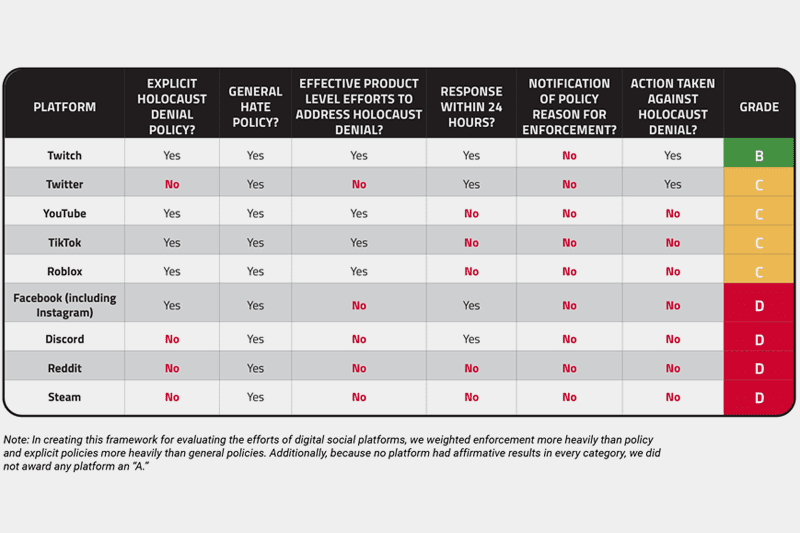Introduction
The online holocaust denial report card explained
Conclusion and recommendations
The Holocaust, the systematic murder of approximately six million Jews and several million others by the Nazis, is one of history’s most painstakingly examined and well-documented genocides.
Nevertheless, in the decades since World War II, a small group of antisemites has repeatedly attempted to cast doubt on the facts of the Holocaust concerning Jewish victims. They claim that Jews fabricated evidence of their genocide to gain sympathy, extract reparations from Germany and facilitate the alleged illegal acquisition of Palestinian land to create Israel.
This phenomenon, known as Holocaust denial, is founded on stereotypes of Jewish greed, scheming, and the belief that Jews can somehow force massive institutions, governments, Hollywood, the media, academia, to promote an epic lie. In the United States, until the early 2000s, Holocaust denial was dominated by the extremist right, including white supremacists, who had a vested interest in absolving Hitler from having committed one of the most monstrous crimes the world has ever known. Today, Holocaust denial in the U.S. has moved far beyond its original fringe circles on the extremist right to become a phenomenon across the ideological spectrum.
On October 12, 2020, after nearly a decade of advocacy by ADL and others, Facebook announced that it changed how its platforms categorized Holocaust denial content. Holocaust denial would no longer be classified as misinformation. Facebook would now address Holocaust denial as hate speech. This change resulted from a campaign by ADL and others in the Jewish community demanding Facebook treat Holocaust denial as one of its most serious content violations.
Holocaust denial is not just a problem on Facebook, however. A September 2020 survey found that 49 percent of American adults under 40 years old were exposed to Holocaust denial or distortion across social media. ADL’s 2020 survey of hate, harassment and positive social experiences in online games found that one in ten (10%) of American adult gamers have encountered Holocaust denial in online games. While the actions of Facebook, the largest communication platform in human history, are important, it is also important to keep track of how other platforms with tens, and sometimes hundreds, of millions of users are addressing pernicious Holocaust denial on their platforms.
In January 2021, ADL investigated how a variety of platforms address Holocaust denial content. Our investigators both reviewed the policies regarding Holocaust denial on various digital social platforms and looked for examples of Holocaust denial across different tech platforms from social media to online gaming sites. We then reported the Holocaust denial content under the platform’s anti-hate policies from non-official accounts to see how platforms would enforce their policies for ordinary users. We created a report card on how tech companies are currently managing Holocaust denial content on their digital social platforms based on these results. The results present a snapshot in time, but give rise to significant concern.
Investigation Report Card
Limitations and Caveats
The investigation our researchers undertook was non-exhaustive, and cannot be said to represent the overall prevalence of Holocaust denial content across any of the stated platforms. What we are evaluating in this investigation are the stated policies of the platforms in question and their responsiveness to the average user in reporting egregious violations of those policies.
We did not include every digital social platform in this investigation. Our investigators focused on a cross-section of mainstream tech platforms and services that have publicly expressed their commitment to addressing hate on their platform and whose platforms would be easily searchable by an average user. For example, we did not include in this investigation platforms such as Gab, 4chan or Telegram that have few if any policies regarding hate, extremism, or Holocaust denial. We also did not include hosting providers, payment processors, or online games whose services are not broadly searchable.
It is important to note that each of these platforms are serving billions of users. We recognize the challenge of enforcing platform policies consistently and at scale. If a platform of a billion users who each post once a day enforced its policies accurately 99 percent of the time, that would still leave 10 million errors on the platform every day. Even so, each of those 10 million errors would not just be a statistic. Each error represents the lived experience of at least one human being per comment, a person exposed to harassment, a threat of violence, misinformation or some other harmful phenomena resulting from platforms operating at these massive scales. Whether enforcement can ever be perfect, we still believe there is significant room for improvement across all platforms regarding how they design their products and prioritize resources toward the moderation of harmful content. This investigation intends to capture how platforms function around Holocaust denial from the perspective of an affected individual user and provide constructive criticism, while also acknowledging that it cannot represent every user of every platform at all times.






